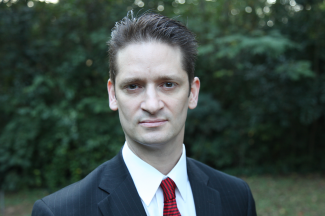Levi McLaughlin

Bio
Levi McLaughlin is Professor at the Department of Philosophy and Religious Studies at North Carolina State University. He received his Ph.D. from Princeton University after previous study at the University of Tokyo, and he holds a B.A. and M.A. in East Asian Studies from the University of Toronto. He has worked as a research assistant at Kokugakuin University in Tokyo and was a visiting research fellow at the University of Michigan’s Center for Japanese Studies, the Asia Research Institute at the National University of Singapore, and the Center for Asian and Pacific Studies at the University of Iowa. He was previously an Assistant Professor of Religion at Wofford College.
Levi’s research focuses primarily on religion in modern and contemporary Japan and considers how the category “religion” takes shape in the contexts of politics, education, and related spheres. He is the first non-member, non-Japanese researcher to spend years as a participant observer of Soka Gakkai, a highly influential lay Buddhist organization that is affiliated with the political party Komeito (part of Japan’s governing coalition) and claims the largest membership of any modern Japanese religious organization. His publications and presentations to date have centered on grassroots-level experiences of Soka Gakkai members, and his work considers how this organization challenges widely accepted “religion” parameters through business, cultural, doctrinal, educational, media, and political initiatives.
His recent scholarship builds on this project to investigate religious dimensions of contemporary Japanese politics to investigate a dynamic network of religions and religion-affiliated nationalists who exert significant influence on government in Japan through Shinto organizations, ethics training groups, corporations, and other ideologically motivated collectives. This work includes ethnographic and documentary investigations of Nippon Kaigi, the Association of Shinto Shrines, and related organizations and individual activists. Since the murder of former Prime Minister Abe Shinzō in July 2022, Levi has concentrated on upheavals in Japan’s religio-political landscape occasioned by this shocking event. He has undertaken fieldwork with members of the Unification Church in Japan to expand his inquiries into Japan’s religion/politics nexus.
Since 2011, Levi has examined religious responses to earthquake, tsunami, and nuclear disasters in Japan. This took him to the evacuation zones of Fukushima and into family homes in temporary housing facilities adjacent to communities devastated by the tsunami across Japan’s northeast. He applies his findings to theoretical investigations of the category “catastrophe” and ways post-disaster religious aid initiatives in Japan are contributing to global discourses on healing, spirituality, and trauma. In relation to this work, he has written and presented on religious dimensions of Japan’s response to the COVID-19 pandemic.
Some of Levi’s recent publications return to his earliest research endeavors, which built on his long-term ethnographic engagement as a violinist within Soka Gakkai musical ensembles. This work include analyses of aesthetics, performance, and the effects of artistic immersions on life courses and institution-building within religious organizations.
Articles and book chapters by Levi appear in English and Japanese in The Asia-Pacific Journal, Asian Ethnology, Japanese Journal of Religious Studies, the Journal of the American Academy of Religion, Sekai, the Social Science Japan Journal, and other publications. Levi is co-author and co-editor of Kōmeitō: Politics and Religion in Japan (IEAS Berkeley, 2014) and co-editor of several journal special issues on disaster, aesthetics, media, law, and other fields. His book Soka Gakkai’s Human Revolution: The Rise of a Mimetic Nation in Modern Japan was published by the University of Hawai`i Press in 2019 and was published in Japanese by Kodansha in 2024.
Levi teaches courses on topics including Asian religions (particularly traditions of Japan and China), theories and methodologies of the study of religion, religion and politics, critical thinking, fieldwork methodology, and religion and development.
Website
https://bsky.app/profile/levimclaughlin.bsky.social
Education
Ph.D. Religion Princeton University 2009
M.A. East Asian Studies University of Toronto 1998
B.A. Japanese Studies University of Toronto 1996
Area(s) of Expertise
Buddhism and other Asian religions (particularly traditions of Japan and China), history of modern Asia, theories and methodologies of the study of religion, religion and politics in Asia, anthropology of religion, fieldwork methodology, religion and development.
Publications
- Catastrophe , Critical Terms for Religious Studies, 2nd edition (2025)
- Politics and Governance , The New Nanzan Guide to Japanese Religion (2025)
- In Religion-Averse Japan, a Religion-Backed Party Remains Pivotal , Berkley Forum (2024)
- Introduction: Behind the Scenes of Media and Legal Responses to the Abe Assassination , The Asia-Pacific Journal: Japan Focus (2024)
- With the Liberal Democratic Party Struggling, Komeito's More Vital to Japan's Ruling Coalition Than Ever Before , Sasakawa USA Japan Political Pulse (2024)
- 創価学会ー現代日本の模倣国家 , Kodansha (2024)
- Constitutional Buddhism: Japanese Buddhists and Constitutional Law , Buddhism and Comparative Constitutional Law (2023)
- Faith in Mount Fuji: The Rise of Independent Religion in Early Modern Japan , JOURNAL OF THE AMERICAN ACADEMY OF RELIGION (2023)
- The Abe Assassination and Japan’s Nexus of Religion and Politics , Current History (2023)
- A Grudge Against the Unification Church Motivated the Murder of Japan’s Most Prominent Politician , (2022)